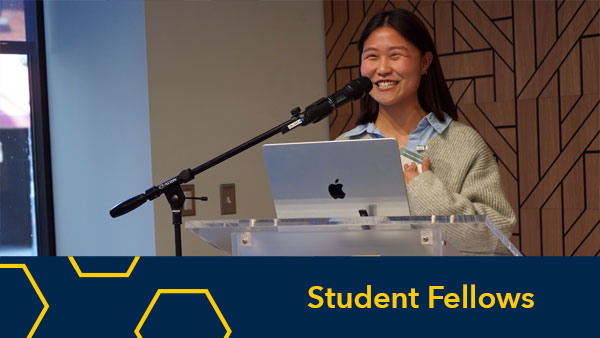Elyse Aurbach, Public Engagement Lead (Office of Academic Innovation) @ElyseTheGeek
Laura Sánchez-Parkinson, Assistant Director for Programs and Development & Program Manager for Research (National Center for Institutional Diversity) @lsparkinson
Diversity, Public Engagement, and Innovation are – and should be – aligned.
Bottom-up enthusiasm, top-down leadership, and external pressures are mobilizing colleges and universities to prepare students and faculty in engaging with broader publics to solve complex social issues in our society. At some institutions, groups of students and faculty have organized to promote and prepare civically engaged leaders and scholars. Some institutional leaders have led the way in launching campuswide commitments to public engagement and diversity and devoted resources to mobilize their campus communities. While these efforts have often been announced and designed in isolation, institutions have an opportunity to address social issues of our time and utilize its academic resources and power to advocate for democracy, equity, and social justice.
Our University of Michigan campuses have worked to meet these missions by supporting a very rich history in engaging with ideas and people beyond our academic walls and establishing a commitment to innovation and diversity, equity and inclusion. President Schlissel renewed these commitments and launched a strategic area of focus on public engagement and impact to scale our campus community’s efforts and reimagine engagement for the 21st century. This effort has great potential to transform complicated social justice challenges if we approach them inclusively and equitably.
We see these important mission-driven areas of focus to be aligned and connected.
Our university aims to build mutually beneficial partnerships both within and beyond the academy. In so doing, we can create opportunities for our campuses and public communities to partner and learn from each other, enriching our work and its impact. People with different educational backgrounds and professions, with different life experiences, and with different outlooks and perspectives all bring to bear important insights into understanding complex problems and building solutions. In this way, engaging equitably and inclusively beyond our University walls can become a driver of innovative discussions and solutions.
Approaching these challenges requires reflection and care. We must name our challenges and look to our histories to recognize and address how historical inequities have caused or exacerbated problems within and between communities – both within and beyond our campus. And we must commit to addressing these issues collaboratively, inclusively, and equitably.
Beginning a Conversation
On October 8, the National Center for Institutional Diversity, the Office of Academic Innovation, the Office of Diversity, Equity, and Inclusion, and the Alumni Association co-hosted an event exploring these themes called Social Transformation through Public Engagement. Consisting of a panel discussion and a series of roundtables, the event named challenges facing the academy, honored past work and current actors, and mobilized our campus communities to commit to advancing DEI-focused public engagement efforts.
The panel was introduced by President Mark Schlissel and moderated by Earl Lewis, professor of history and Afroamerican and African studies and director of the Center for Social Solutions. The panel discussion featured Mary Jo Callan (Director of the University of Michigan Edward Ginsberg Center), Abdul El-Sayed (Former Democratic Candidate for Michigan Governor and Former Executive Director of the Detroit Health Department and Health Officer for the City of Detroit), Angela Reyes (Executive Director and Founder of the Detroit Hispanic Development Corporation), Jim Leija (Director of Education and Community Engagement at the University Musical Society), and Luis Trelles (Producer of Radio Ambulante at NPR and 2018 Knight-Wallace Fellow). The panelists explored a number of themes, including:
- The history of diversity and public scholarship at the University of Michigan – including both powerful positive examples like the work of James Jackson and Patricia Gurin as well as times when our efforts fell short or caused harm
- The opportunities visioned, realized, and missed to invite and welcome communities to our campus, including creating avenues for youth of color to access and thrive at the University
- The role of equity, mutual benefit, and reciprocity in impactful and inclusive engagement work – like the efforts at the Detroit Urban Research Center, which impact and were co-developed with publics through community-based participatory research
- The role of public engagement in addressing complex social justice issues by bringing together scholars and members of our local and national communities to highlight and explore community experiences and histories
- How social media and a non-stop news cycle has influenced dialogue and public discourse: simultaneously creating community organizing power and new avenues for public expression while also limiting time to process and respond thoughtfully to current events and contributing to hyper-polarization
- Inclusion as an avenue for innovation – when we leverage the rich, deep power of diverse perspectives, we can think more creatively to disrupt the status quo
In addition to the panel discussion, faculty, alumni, staff, and students met in small groups to explore critical issues and barriers in DEI-focused engagement work. Some of the topics discussed include:
- The risks and rewards of doing diversity public scholarship;
- Acknowledging and expanding participation of scholars with marginalized identities, students, and staff in pursuing this work.;
- Exploring the skills and training opportunities needed for effective engagement; and
- How public engagement and diversity are valued and incentivised in academic institutions, especially in hiring, merit review, and promotion.
Mobilizing for Action
Social Transformation through Public Engagement began a conversation on our campus that we hope will mobilize our communities to address complex issues at the intersection of diversity, equity, and inclusion, innovation, and public engagement. What kinds of opportunities and actions might catalyze this movement?
We commit to furthering these efforts by continuing to create spaces to bring together our campuses and communities in conversation and planning, to advocate for changes in our university system which will reduce barriers to access and incentivize the value of these efforts, and to create new and innovative ways for our communities to engage ethically and justly with our publics.


